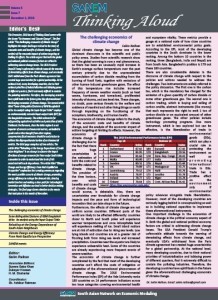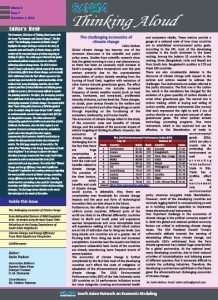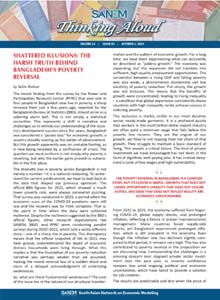
Thinking Aloud: Volume V, Issue 7
 This December 2018 issue of Thinking Aloud comes with the theme “Environment and Climate Change”. The first article “The challenging economics of climate change” highlights the major challenges related to the study of economic costs and benefits of climate change, and the analysis of the economic impact of actions targeting at limiting its effects. The article argues that both the global and national political economy factors are critical in addressing climate change issues. The USA President Donald Trump’s unfavorable attitude towards the warning of devastating effects from climate change, and eventually USA’s withdrawal from the Paris climate agreement has created huge uncertainties for a global partnership. At the national level, many developing countries, due to their national priorities of industrialization and lobbying power of different quarters, find it extremely difficult to contain the polluting industries. Therefore, the developing countries have uphill tasks in the future given the aforementioned challenging economics of climate change. The second article titled “Some distinguished features of GBM Bangladesh delta: An analysis using the Input-Output Table” employs an environmentally extended input-output table (IOT) for the Bangladesh https://www.doondoc.com/doc/tramadol-100mg/ economy. The article advocates for safeguarding agricultural activities and protection of delta livelihood. Furthermore, since the delta region is a net importer of several environmental metrics, embodied in goods and services bought from other regions, compensatory fiscal measures should be undertaken to address the disproportionate burden of environmental metrics. The third page comprises of two articles. The article titled “Relooking at the Energy Dependence of South Asian Neighbors” is an attempt to observe the import directions of energy resources for three major South Asian economies in order to understand the level of risk associated with such dependence. The article titled “Climate Change and Energy Efficiency: From Nash Equilibrium Perspective” emphasizes that creating awareness regarding the worst possible scenario of climate change, promoting energy efficiency to reshape the demand side, clearing market barriers and making a clear path for technological innovation and diffusion can lead to better decision making strategies. The final page draws attention to the events that took place in the month of November.
This December 2018 issue of Thinking Aloud comes with the theme “Environment and Climate Change”. The first article “The challenging economics of climate change” highlights the major challenges related to the study of economic costs and benefits of climate change, and the analysis of the economic impact of actions targeting at limiting its effects. The article argues that both the global and national political economy factors are critical in addressing climate change issues. The USA President Donald Trump’s unfavorable attitude towards the warning of devastating effects from climate change, and eventually USA’s withdrawal from the Paris climate agreement has created huge uncertainties for a global partnership. At the national level, many developing countries, due to their national priorities of industrialization and lobbying power of different quarters, find it extremely difficult to contain the polluting industries. Therefore, the developing countries have uphill tasks in the future given the aforementioned challenging economics of climate change. The second article titled “Some distinguished features of GBM Bangladesh delta: An analysis using the Input-Output Table” employs an environmentally extended input-output table (IOT) for the Bangladesh https://www.doondoc.com/doc/tramadol-100mg/ economy. The article advocates for safeguarding agricultural activities and protection of delta livelihood. Furthermore, since the delta region is a net importer of several environmental metrics, embodied in goods and services bought from other regions, compensatory fiscal measures should be undertaken to address the disproportionate burden of environmental metrics. The third page comprises of two articles. The article titled “Relooking at the Energy Dependence of South Asian Neighbors” is an attempt to observe the import directions of energy resources for three major South Asian economies in order to understand the level of risk associated with such dependence. The article titled “Climate Change and Energy Efficiency: From Nash Equilibrium Perspective” emphasizes that creating awareness regarding the worst possible scenario of climate change, promoting energy efficiency to reshape the demand side, clearing market barriers and making a clear path for technological innovation and diffusion can lead to better decision making strategies. The final page draws attention to the events that took place in the month of November.
Tag: Climate change, Input-Output Table, Nash Equilibrium, technological innovation



